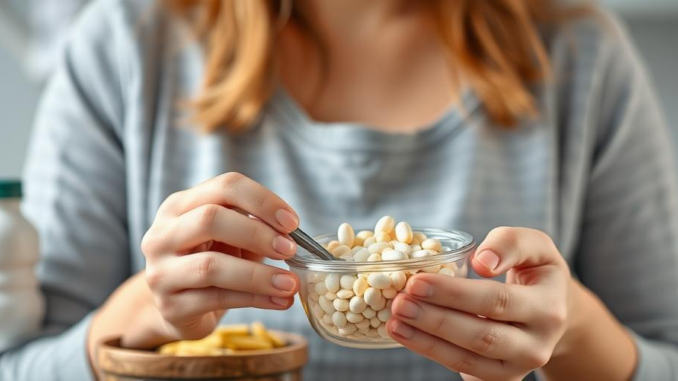
Summary
New research suggests a link between certain food additive mixtures and an increased risk of type 2 diabetes. Two mixtures, one found in processed foods like sauces and desserts, and another common in sweetened drinks, showed the strongest association. These findings highlight the importance of understanding the combined effects of food additives on our health.
** Main Story**
Food additives are under the microscope again, and this time, researchers are exploring a potential link to type 2 diabetes. It’s another piece of the puzzle in understanding how those ubiquitous ingredients in ultra-processed foods might impact our health. These additives, while designed to enhance flavor, texture, or shelf life, are raising questions about their cumulative effect on our metabolic well-being. Are we truly grasping the full picture?
Additive Mixtures: A Closer Look
A recent study published in PLOS Medicine dug into the relationship between common food additive combinations and the development of type 2 diabetes. Think of it like this: you might be okay with one ingredient, but what happens when it’s mixed with a bunch of others? The study’s researchers analyzed data from over 100,000 participants in the NutriNet-Santé cohort study, a large prospective cohort study conducted in France. These participants tracked their dietary intake through detailed 24-hour dietary records over almost eight years. That’s a lot of data! Using computer algorithms, the researchers pinpointed common patterns in how additives were consumed together. And that’s where things got interesting.
The Culprits? Two Key Mixtures
Out of five additive mixtures identified, two stood out. They had a significant association with a higher risk of developing type 2 diabetes. Okay, here’s the breakdown:
-
Mixture #1: Modified starches, pectin, guar gum, carrageenan, polyphosphates, potassium sorbate, and curcumin. Sound familiar? It’s often lurking in broths, dairy desserts, fats, and sauces. This concoction was linked to about an 8% bump in risk. Not huge, but definitely noteworthy.
-
Mixture #2: Citric acid, sodium citrates, and artificial sweeteners. This one’s a classic in soft drinks and sweetened beverages. This particular mix was linked to about a 13% increased risk of type 2 diabetes.
Important Considerations…
Now, before you throw out everything in your pantry, it’s crucial to remember a couple of things. First, this study is observational. It’s not proof that these mixtures cause diabetes. It simply shows a correlation. Also, researchers tried to control for a bunch of factors – age, sex, BMI, activity level, smoking, education, even profession and overall diet. That said, there’s always a chance that some other, unmeasured factors, played a role. It’s science, after all. It’s not always black and white.
Why This Matters: Implications & Next Steps
What this research does highlight is the need for a deeper dive into how food additive mixtures are assessed for safety. Current regulations tend to focus on individual additives, ignoring the potential interactions they might have when combined. It’s like evaluating a single instrument in an orchestra without considering the overall sound. Makes you think, doesn’t it?
Going forward, research should focus on the how, the why. How do these mixtures potentially contribute to type 2 diabetes? The gut microbiome is a prime suspect. Some additives are known to mess with gut bacteria and glucose metabolism. Think of the gut as a garden; certain additives might be like weeds, disrupting the balance.
What You Can Do: Practical Steps
While we wait for more definitive answers, here are a few steps you can take:
- Cut Back on Ultra-Processed Foods: It’s pretty straightforward, really. Reduce the amount of sugary drinks, packaged snacks, and ready-made meals in your diet. You know, the usual suspects.
- Embrace Whole Foods: Prioritize fruits, vegetables, whole grains, lean proteins. These are naturally low in additives and packed with goodness. My grandmother always said, “Eat your greens!” She was onto something.
- Become a Label Reader: Take a look at those ingredient lists and choose products with fewer additives when you can. Every little bit helps, right?
The Road Ahead
Ongoing research is essential to solidify the link between these mixtures and type 2 diabetes. We need to understand how these additives interact and their impact on our metabolic health. And further studies are necessary to establish cause and effect definitively. This could have significant implications for public health guidelines and food safety regulations. After all, aren’t we all just trying to make informed choices about what we eat?


This research highlights the need for more comprehensive risk assessments of combined food additives. Could advanced analytical techniques, like metabolomics, help us better understand the synergistic effects of these mixtures on human metabolism and inform more effective food safety regulations?
That’s a great point! Metabolomics could offer invaluable insights into how these additive mixtures affect our metabolism at a molecular level. Understanding those synergistic effects is key to developing more effective and comprehensive food safety regulations. Thanks for highlighting that!
Editor: MedTechNews.Uk
Thank you to our Sponsor Esdebe
Given the focus on mixtures, is there evidence suggesting that the observed associations are driven by specific interactions between the listed additives, rather than the presence of a single, key additive within each mixture?
That’s a really insightful question! The study highlights associations with mixtures, but teasing out specific interactions is crucial. Future research exploring the individual contributions and synergistic effects within those mixtures would definitely strengthen our understanding. Thanks for raising this important point!
Editor: MedTechNews.Uk
Thank you to our Sponsor Esdebe